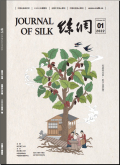丝绸2024,Vol.61Issue(1):1-10,10.DOI:10.3969/j.issn.1001-7003.2024.01.001
数字化转型对纺织业升级的影响研究
Research on the influence of digital transformation on the textile industrial upgrading
摘要
Abstract
With the innovation and development of technology,the digital economy occupies an increasingly important position in the information era and becomes an important component of modem economic development.The digital transformation of enterprises is an inevitable trend for the development of the national economy and the transformation of businesses.Achieving the digital transformation of traditional enterprises holds significant importance for the operation and growth of the national economy.The textile industry,as a pillar industry within the traditional sector,finds its new opportunities for growth and future development in digital transformation.Therefore,it is important to have a proper understanding of the impact of digital transformation on the upgrading of the textile industry,and to reveal the underlying mechanisms of this impact,which is of great theoretical value and practical significance for achieving high-quality development in the textile industry. To explore the impact of digital transformation on the upgrading of the textile industry,this study took a micro perspective and analyzed the specific mechanisms through which digital transformation affects the upgrading of the textile industry,namely improving operational effectiveness,market effectiveness,cost effectiveness,and innovation effectiveness.Subsequently,empirical tests were conducted by using data from listed textile industry companies in the A-share market from 2012 to 2020.For the core explanatory variables,this paper constructed an index for digital transformation using text analysis.As for the dependent variables,industrial upgrading was divided into process upgrading and functional upgrading,with enterprise productivity and labor productivity as measures for the former,and operating profit margin as a measure for the latter.To avoid errors caused by the omitting important variables,this study also selected control variables such as enterprise size,human capital,innovation input,enterprise debt ratio,equity concentration,board size,and current asset turnover rate.The mediating effect model was used to test the impact mechanisms.And the regression results show that digital transformation has a positive and significant impact on the upgrading of the textile industry,promoting both process upgrading and functional upgrading.These results hold under a series of robustness tests.Digital transformation primarily promotes the upgrading of the textile industry through operational effectiveness,cost effectiveness,and market effectiveness,while innovation effectiveness is found to be insufficient in constituting an effective mediator. Based on the research findings,this study put forward corresponding policy recommendations.Firstly,it suggested establishing an internet platform for the textile industry to facilitate the co-construction and sharing of information among different supply chain segments.Secondly,promoting the development of local digital industry parks and industrial clusters in the textile industry was recommended to foster collaborative development and digital transformation among large-sized,medium-sized,and small-sized textile enterprises.Thirdly,advancing the integration of industry,academia,and research in the textile industry was proposed to enhance the efficiency and level of technology innovation transfer. Different from traditional research focusing on factors such as industry value chains and management capabilities to study the upgrading of the textile industry,this study incorporates digital transformation into the analytical framework and systematically explores the impact mechanisms of enterprise digital transformation on industrial upgrading,providing a new perspective for understanding the upgrading of the textile industry.However,there are still some limitations in this study.For example,the analysis is constrained by the limited number of listed textile industry companies,preventing further heterogeneity analysis.Additionally,the mechanism analysis of digital transformation is based on the summary of existing research and lacks more intuitive descriptions through mathematical models.Looking ahead,possible future research directions include more specific heterogeneity analysis,such as exploring whether there are differences in digital transformation among related enterprises in the textile industry,such as textile clothing,apparel industry,chemical fiber manufacturing industry,and whether the progress of digital transformation is consistent among large,medium,and small enterprises.Another direction is to investigate the role of the government in digital transformation of the textile industry,the formulation of relevant policies,and the evaluation of the effectiveness of these policies.关键词
数字化转型/纺织业/产业升级/影响机制/中介效应/文本分析法Key words
digital transformation/textile industry/industrial upgrading/influence mechanism/mediating effect/text analysis分类
轻工纺织引用本文复制引用
李建琴,童文庆,周恒..数字化转型对纺织业升级的影响研究[J].丝绸,2024,61(1):1-10,10.基金项目
国家现代农业产业技术体系资助项目(CARS-18) (CARS-18)
国家自然科学基金重大项目(72192803) (72192803)

